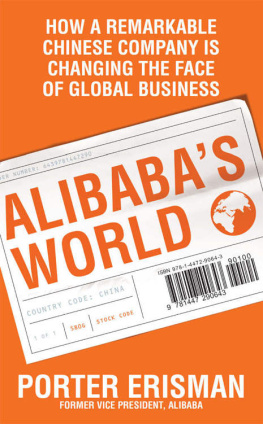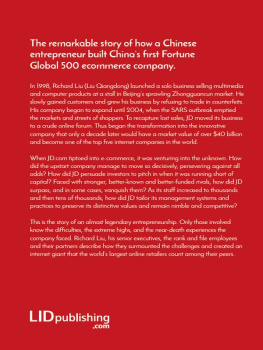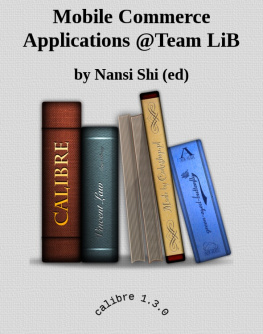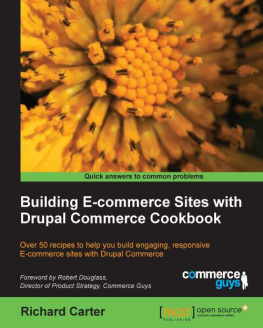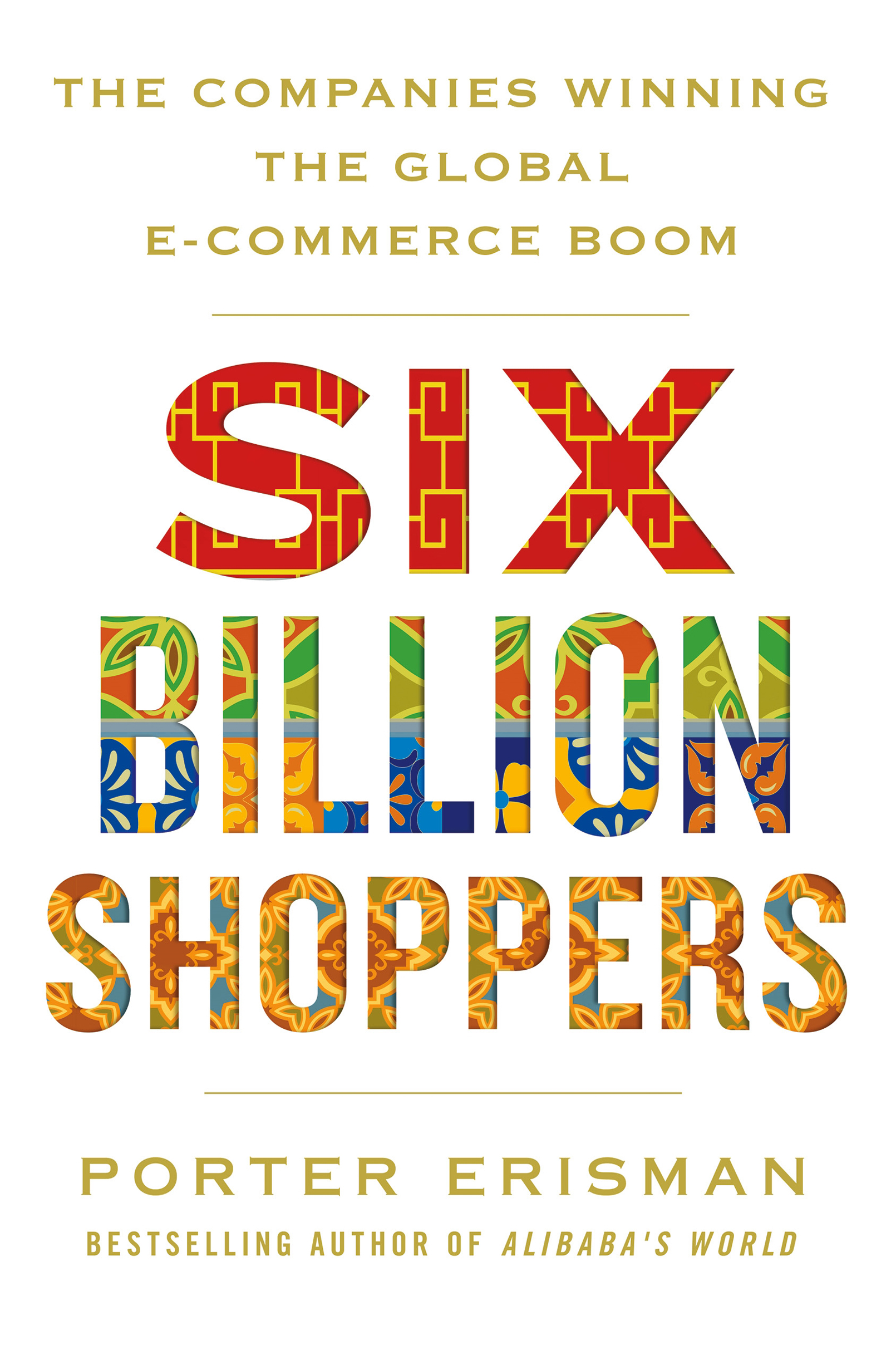Contents
Guide
Pagebreaks of the print version

The author and publisher have provided this e-book to you for your personal use only. You may not make this e-book publicly available in any way. Copyright infringement is against the law. If you believe the copy of this e-book you are reading infringes on the authors copyright, please notify the publisher at: us.macmillanusa.com/piracy.
For Melanie, Lindsay, and Jacob, with love
Id like to offer my deepest gratitude to all of the entrepreneurs who shared their stories for this book.
Thanks also to Jason Overdorf for his help on the India chapter. Jason drew on his experience as a journalist in both China and India to help me connect the dots between the two countries.
Id also like to thank the team at St. Martins Press for their support in making this book happen. A special thanks to Emily Carleton, whose help and support on my first book, Alibabas World , helped lead to Six Billion Shoppers , in which she also played an important role. Id also like to thank the others at St. Martins Press who helped with the book: George Witte, Annabella Hochschild, Donna Cherry, Sara Thwaite, Gabrielle Gantz, Karlyn Hixson, Paul Hochman, Rowen Davis, Sally Richardson, and Jennifer Enderlin.
Thanks also to my mother, who helped me recall the scenes we encountered when visiting the floating markets of Bangkok when we traveled there in 1985 (a trip that first sparked my interest in emerging markets). And finally, a special thanks to Mayumi, little Aili, my father, and the rest of my family for giving me the support and sense of purpose required to undertake a project like this.
My eyes locked on the knife blade, now within inches of my throat. My attackers three accomplices held my arms behind my back, exposing my chest. For a moment, e-commerce was the last thing on my mind. The more important question was, Am I going to die here, in broad daylight, in a Bogot alleyway?
Barrio! barrio! barrio! Even with my Sesame Street Spanish, I recognized that word. Neighborhood. Clearly, I had entered the wrong one.
My first trip to South America was off to a bad start. I had arrived in Bogot the night before to kick off a five-city speaking tour, during which I would share my experience of working at Alibaba and observing the e-commerce boom in China. I played it safe at first, crashing in my hotel room despite the tempting salsa music emanating from the bar across the street.
When daylight came, I ventured out along the avenue to the Plaza de Bolvar, a wide-open square lined by Spanish colonial buildings. The entire city seemed to be outside, with kids playing freely in the streets, which were closed to traffic. Maybe Colombia is much safer than what was depicted in all the drug movies I watched when I was growing up, I thought.
The only signs of Colombias violent past were the police, dressed in military fatigues and toting rifles over their shoulders. Stationed at regular intervals along the avenue, they were clearly in place to keep the peace and allow pedestrians to enjoy their Sunday morning.
Emboldened by the added security, and eschewing old stereotypes, I ventured outside the city center to see if I could find a path to the top of a nearby mountain to get a view. I passed a yellow church and could hear people singing hymns. From behind the church I walked up a cobblestone path in the direction of the mountain. Thats where I met my teenage attackers.
As their angry yells got louder, the ringleader fumbled to lock his folding knife in place, as if preparing to stab me. I began to panic. Please! Please! No comprende. No comprende! I pleaded. I pulled my wallet from my back pocket and dropped it on the ground in front of me. I reached into my front pocket and handed over my iPhone. Although they didnt seem to actually want my money, I was offering everything I had.
Finally, the attackers let go of my arms and took a step back. The leader scowled at me and motioned with his hand, shooing me away. The message in his eyes was cleardont come back. I ran down the hill as fast as I could, cursing my naivet.
You must have crossed one of the barrios invisible lines, a local told me later. There is a lot of drug and gang activity up there, and people know where the boundaries are. People can be killed for just walking into the wrong neighborhood. Youre lucky you didnt fight back.
I couldnt believe how naive Id been. Personal safety was something Id never had to worry about in China. This was a much-needed reminder that in most developing countries, poverty comes with a fair degree of violence.
Once I shook off the nerves, I realized I might have a bigger problem. The Colombian government had sponsored my trip to spread the gospel of e-commerce and entrepreneurship by drawing upon what I had learned in China. In a country where safety and security were such a concern, could those lessons apply? Just a few years earlier, Colombia was considered a failed state. Narcotrafficking had done huge damage to the country, destroying the economy and trust in government institutions.
But at that moment I finally understood the true role of e-commerce in emerging markets: e-commerce had succeeded in China precisely because the economic and legal infrastructure of the country was weak when the Internet was introduced. China lacked the economic, political, and legal institutions necessary for commerce to thrive, and Internet companies and their online communities had stepped in to fill the void.
And why wouldnt that be true elsewhere? From Bogot to Shanghai, from Mumbai to Lagos, the weaker the institutions, the greater the opportunity for e-commerce to take root. And just as e-commerce entrepreneurs in China had faced and solved logistical, payment, and trust issues, Colombian entrepreneurs could use the Internet to address local concerns, including safety and security. And as a business community addresses these issues, e-commerce blossoms, creating new opportunities for entrepreneurs, multinationals, and customers alike.
Does this notion seem Pollyannaish? Absent the example of China, it might. But I had a front-row seat during Chinas e-commerce revolution, so its clear to me that other countries are following suit, transforming both their economies and the way retail is conducted around the world. The boom will affect brands, retailers, providers of logistics, and financial institutions in highly disruptive ways that will become fully apparent only over time.
Just look at where China is today. In 2000, when I joined Alibaba, just as it moved out of founder Jack Mas apartment, skeptics told me that e-commerce would never work in China. The reasons they cited were many: Payment infrastructure was inefficient. Credit card use was nearly nonexistent. Logistics infrastructure was poor. Engineering and management talent was concentrated in Silicon Valley. And, most important, they said, Chinese shoppers would never trust online merchants enough to buy products online.
Fast-forward less than twenty years, and the figures are staggering:
China has now become the largest e-commerce market in the world.
In 2016, in a single twenty-four-hour period, Alibabas consumer websites alone handled more than $17.8 billion in transactions, more than the total combined online sales of Black Friday and Cyber Monday in the United States.
E-commerce in China now represents 14 percent of total retail sales in the country, compared to 8 percent in the United States. By 2020, e-commerce in China will reach an estimated 21.5 percent of total retail sales in the country.


